By Kent R. Kroeger (Source: NuQum.com, September 15, 2022)
Disclaimer: The following essay is not intended to endorse or promote any of the conspiracy theories mentioned herein.
The Joe Rogan Experience (JRE) was the most watched podcast on Spotify in 2021, reports Variety, and appears to be the most watched podcast across platforms in 2022.
Arguably, JRE reaches 11 million viewers per episode.
By comparison, the most popular cable TV news show, Tucker Carlson Tonight, garners between 2 and 4 million viewers per episode.
So when Rogan talks, millions of people listen. Perhaps only the U.S. president can get more attention on demand.
And while I remain a loyal JRE viewer, occasionally I cringe when Rogan speaks conspiracy theory nonsense. I forgave him years ago for once believing the moon landings were staged, but from all appearances he remains open to a belief that the 9/11 attacks were more than just an al Qaeda operation.
In particular, two years ago he helped sustain (while cagily showing skepticism towards) one of the most pernicious conspiracy theories still circulating in the cybersphere: that the 9/11 attacks on the World Trade Center towers were motivated by an attempt to coverup Pentagon financial malfeasance.
“The day before the 9/11 attacks, Rumsfeld gave a press conference where he talked about trillions of dollars missing. The next day a plane slams into the very part of the building where they were doing the accounting,” Rogan told his audience.
So what was Rogan implying? It’s rather obvious.
There is this indisputable fact: The day prior to the 9/11 attacks, Secretary of Defense Donald Rumsfeld gave a press conference announcing the results of a September 21, 2001 U.S. Department of Defense Office of Inspector General report (DoD-IG) which reported $2.3 trillion could not be adequately accounted for in DoD budgets.
Sometimes coincidences are just that…coincidences. That is one of reality’s laws that statistics repeatedly confirms.
Conspiracy theories are built on coincidences that reinforce pre-existing biases and narratives. If you believe the Pentagon and U.S. Intelligence Community (IC) in 1963 were so determined to pursue the war in Vietnam that its leaders were willing to see the assassination of a sitting president opposed to expanding that war, John F. Kennedy’s death makes more sense.
According to the documented evidence, a clearly dangerous man, Lee Harvey Oswald, took advantage of a poorly-prepared Secret Service in order to commit one of the greatest crimes of the century. Did he have help or was programmed to commit this crime? Those are questions that will never be answered sufficiently for many of us. [Jack Ruby’s role in this drama has never made sense to me.]
The truth is that we humans are biologically predisposed to reject randomness. We need explanations. “Life can feel especially senseless to someone whose belief in a purposeful, benevolent universe has been shattered by mercilessly unfair adversity,” says Ralph Lewis M.D., an assistant professor in the Department of Psychiatry at the University of Toronto.
A number of factors allow conspiracy theories to flourish. Firstly, the predilection of presidential administrations and the federal bureaucracy to believe that secrecy is more important to national security (and their legitimacy) than openness has consequences. The greater the government’s emphasis on secrecy, the more fertile the ground for popular conspiracy theories. [That is an hypothesis, not a conspiracy theory.]
Secondly, with increased secrecy, grows distrust. According to public opinion data, the public’s distrust in the nation’s institutions remains near historic lows. And as distrust of the government grows within the general public, the more likely conspiracy theories prosper. [Again, that is an hypothesis, not a conspiracy theory.]
Lastly, the growing determination of our nation’s elected officials to impose censorship on large segments of the general population (and a partisan segment of the general population willing to condone it), increases the opportunity for conspiracy theories to take hold within the public. [I’ll say it again, this an hypothesis, not a conspiracy theory.]
On an admittedly superficial level, the empirical evidence supports these hypotheses.
Figures 1 through 4 show the trends in literary references to the terms conspiracy theory, anonymous source, secret, and government censorship.
Our culture is growing increasingly exposed to these terms in our literature.
Figure 1: Trend in Literary Incidence of Term (1950 to 2019):
conspiracy theory
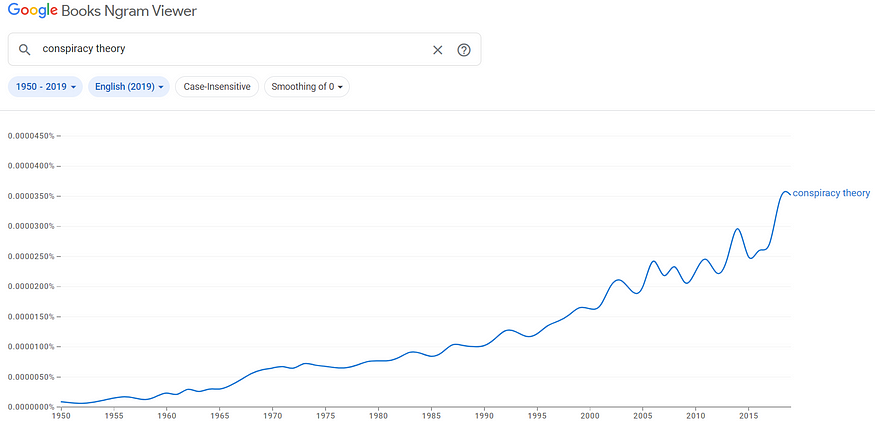
Figure 2: Trend in Literary Incidence of Term (1950 to 2019):
anonymous source
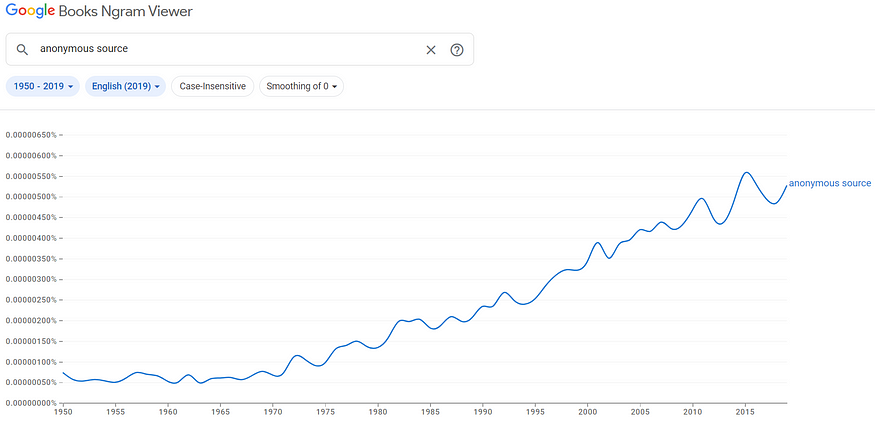
Figure 3: Trend in Literary Incidence of Term (1950 to 2019): secret
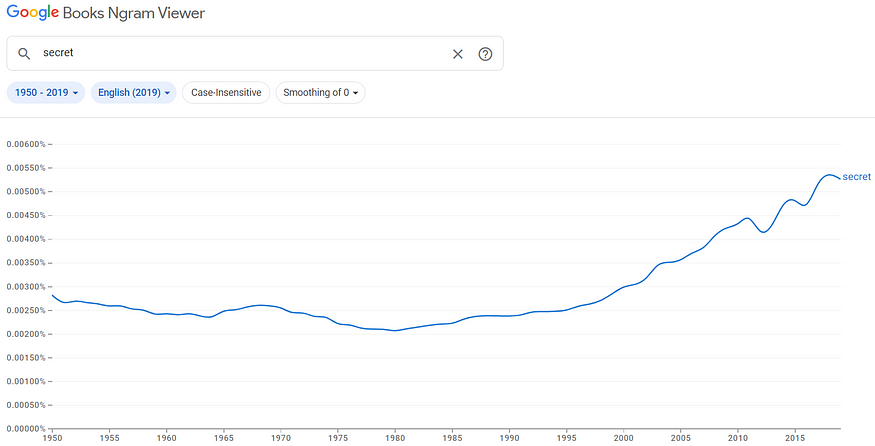
Figure 4: Trend in Literary Incidence of Term (1950 to 2019):
government censorship
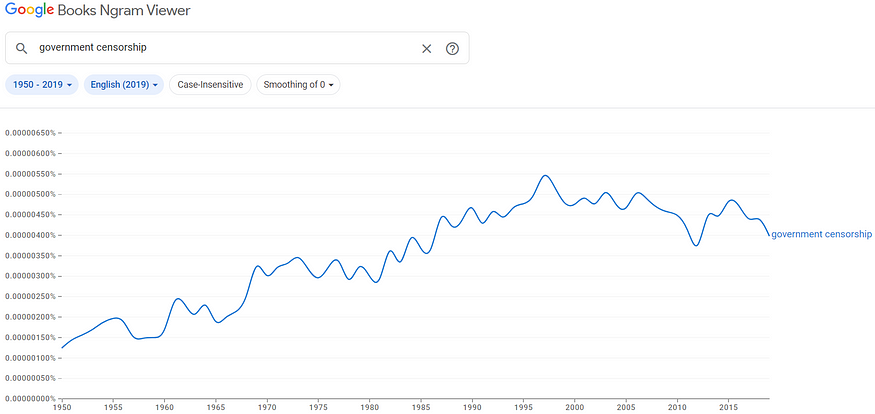
That is our culture today, increasingly exposed to (and subsequently numb to) stories of secrecy, censorship, and conspiracy theories.
And, based on evidence from GDELT, the largest and most comprehensive open database of human communications ever created, recent trends in global online news reinforces this conclusion (see Figure 5).
Figure 5: Trend in U.S. Online News Coverage (Jan. 2017 to Sep. 2022)
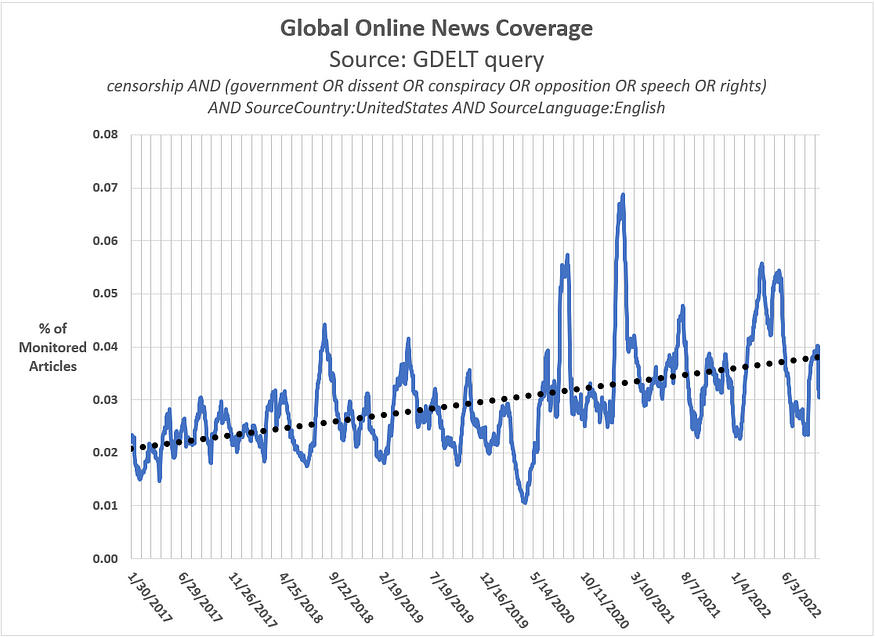
News stories about government censorship is on the rise in the U.S.
Does it reflect a genuine increase in government censorship? The anecdotal evidence says, ‘Yes,’ but the mere perception that it is increasing has its own repercussions.
Marginalized voices are feeling — right or wrong — more restricted than ever (i.e., leftist progressives, populist conservatives, etc.).
And conspiracy theories may be the main beneficiaries of their social diminishment.
Are conspiracy theories dangerous?
I have no fear of being exposed to conspiracy theories, the more absurd the better. As such, I am a regular consumer of such theories on imageboards like 4chan and 8chan (for entertainment purposes only, of course).
I cannot think of one case of something I’ve read on these imageboards that turned out to be substantively true. That is in contrast to a website like Wikileaks where I cannot think of one case where information on that site has been proven to be illegitimate.
Wikileaks is a legitimate source of news — 4chan and other dark-side imageboards are not.
So what is the problem with conspiracy theories? They are simply a symptom, not a cause of social unrest.
Truth be told, the prominence of conspiracy theories in the public discourse may be a ‘canary-in-the-mine’ indicator of how broken our political culture has become in recent years.
So what if I’ve read posts on 8chan suggesting the U.S. defense establishment created (or captured) the SARS-Cov-2 virus and dropped it in the middle of a Wuhan, China seafood market in order to stunt the Chinese economic growth miracle? [If true, they succeeded!]
Overwhelming, the evidence says such a theory is false. But why does the suggestion even exist?
This particular conspiracy theory exists because of the secrecy of the Chinese government (which we can’t control) and a U.S. public health establishment (which we can control) that thinks their role is paternalistic over the U.S. public (as opposed to an agent of the people’s constitutional power).
The best (and worst) conspiracy theories take a documented outcome (e.g., the deaths caused by the SARS-CoV-2 virus) and create theories as to why some segment of society might want and create such an outcome.
That is the greatest power of conspiracy theories. Using contrived theories to explain recognizable facts.
Critical Race Theory (CRT). White supremacy. The emerging Democratic majority. Islamic extremism. Transactivism. The Great Replacement Theory.
These are all sloppy social theories.
They aren’t science. They are politics…in its ugliest and most destructive form.
- K.R.K.
Send comments to: kroeger98@yahoo.com
